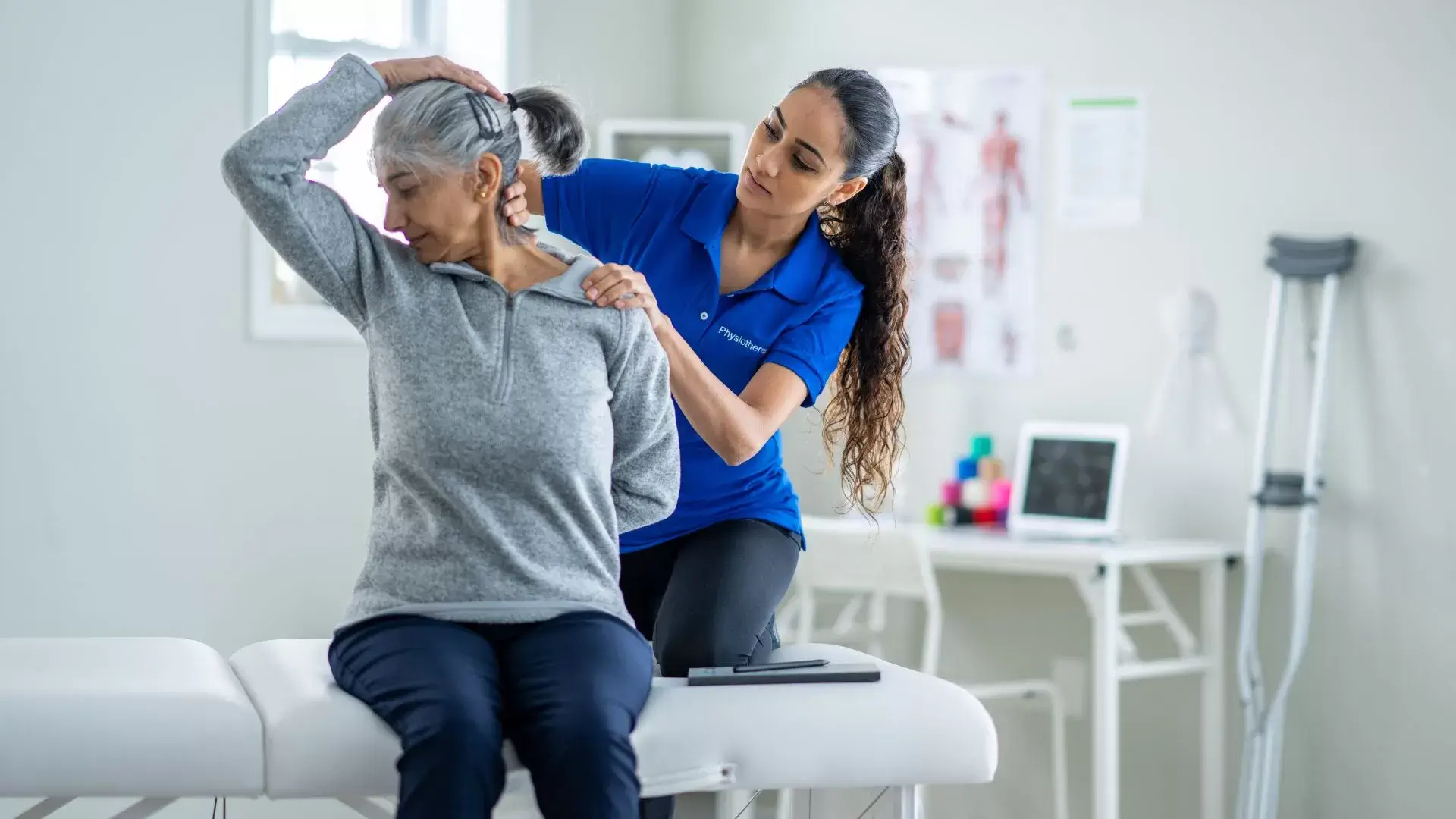Physiotherapy for Concussion is essential for recovering from head injuries, offering tailored strategies to alleviate symptoms and enhance overall function. By conducting thorough assessments, we identify physical and cognitive challenges that arise after a concussion. Our individualized treatment plans integrate recovery exercises, manual therapy, and postural correction to support healing. We also address neck pain and headaches, common issues linked to concussions, and provide education on lifestyle modifications to promote brain health. We’re dedicated to guiding you through your recovery journey, and there’s much more to discover about how our services can help you regain your balance and well-being.

At Physio Chiro Clinic, we offer specialized physiotherapy and chiropractic services designed to effectively address the unique needs of individuals recovering from concussion. Our approach begins with a thorough spinal assessment, allowing us to understand each patient’s specific challenges. From there, we develop personalized treatment plans that incorporate rehabilitation exercises tailored to enhance recovery.
Our services include manual therapy and spinal manipulation, both of which play vital roles in pain management and restoring normal function. We also focus on mobility exercises that empower our patients to regain strength and flexibility. Postural correction is another important component of our care, as it helps alleviate strain on the spine and supports overall recovery.
Additionally, we provide ergonomic adjustments to guarantee our patients can navigate their daily activities comfortably and safely. We believe in holistic spine care, which encompasses not just physical treatment but also education about lifestyle changes that can contribute to long-term health. By working collaboratively, we aim to create a supportive environment where patients can regain their quality of life and feel empowered in their recovery journey. Together, we can navigate the challenges of concussion recovery and promote ideal health and well-being.
Concussions are complex injuries that can arise from various causes, leading to a range of physical, cognitive, and emotional effects that greatly impact recovery. We often overlook the connection between concussions and underlying musculoskeletal conditions, such as congenital kyphosis or other spinal deformities, which may increase the risk of sustaining a concussion. Spinal instability can contribute to poor postural awareness, resulting in postural imbalance, which can aggravate the effects of a concussion.
Additionally, individuals with degenerative disc disease might experience increased upper back pain, which could further complicate concussion recovery. Musculoskeletal dysfunction can exacerbate symptoms and hinder rehabilitation efforts. It’s essential for us to understand these interconnected factors, as they can play a significant role in both the onset of concussions and the challenges we face during recovery.
Recognizing the symptoms of a concussion is essential, especially since individuals with pre-existing musculoskeletal conditions may present unique challenges in identifying and addressing these signs effectively. Common symptoms of a concussion include headaches, dizziness, and confusion, but we also need to be aware of accompanying issues like neck pain and thoracic pain. These can stem from spinal misalignment or muscle tightness that may arise after the injury.
In our practice, we often find that stiffness in the neck or upper back can exacerbate concussion symptoms. It’s vital to differentiate between the concussion itself and any secondary issues related to existing conditions. By understanding the interplay between these symptoms, we can better tailor our approach.
Integrating physical therapy techniques, including postural therapy and ergonomics, can help manage these challenges. Flexibility exercises can also be beneficial in alleviating muscle tightness, which might contribute to discomfort. By recognizing and addressing these symptoms holistically, we can provide thorough support for those experiencing concussions, ensuring a more effective recovery process.
Physiotherapy plays an essential role in supporting recovery from concussions by addressing both physical and functional challenges that individuals may face during their healing process. We’re often confronted with issues like postural kyphosis and forward head posture, which can exacerbate symptoms. Through tailored physiotherapy interventions, we focus on spinal correction, helping to restore proper alignment and reduce discomfort.
Core strengthening exercises are fundamental to our approach, as a strong core stabilizes the body and supports recovery. Additionally, we incorporate stretching routines to improve flexibility and reduce tension. Trigger point therapy is utilized to relieve muscle tightness, which can often accompany concussive injuries.
We also find that yoga for posture can be particularly beneficial, promoting mindfulness and enhancing body awareness. Movement therapy is another vital component, encouraging gentle, controlled movements that aid in regaining balance and coordination.

Managing long-term symptoms of post-concussion syndrome can be challenging, but with the right strategies and support, we can help individuals navigate their recovery journey effectively. Many people experience a range of long-term symptoms, including spinal rigidity and shoulder pain, often exacerbated by poor posture.
To address these issues, we recommend a combination of anti-inflammatory medication and physical therapy. Strengthening exercises can play a crucial role in improving posture and alleviating discomfort associated with spinal rigidity. Additionally, massage therapy can provide relief from chronic shoulder pain and promote overall relaxation, supporting the healing process.
We also emphasize the importance of workplace ergonomics. Creating an ergonomic workspace can minimize strain and help individuals maintain proper posture throughout their workday. By making these adjustments, we can greatly reduce the risk of developing compression fractures and other complications related to poor ergonomics.
Ultimately, our goal is to provide a holistic approach to managing post-concussion syndrome, ensuring that individuals have access to the resources and tools they need for a successful recovery. Together, we can empower those affected to regain control over their lives and improve their quality of life.
Addressing the long-term symptoms of post-concussion syndrome often leads us to contemplate vestibular therapy, which can effectively target balance and dizziness issues that many individuals experience during their recovery. Vestibular therapy focuses on retraining the brain and body to manage sensory input, promoting better balance and coordination.
Through specialized exercises, we can enhance our body mechanics and improve stability. Techniques such as myofascial release may also be integrated, helping to alleviate tension and restore proper function. For those struggling with severe balance issues, spinal orthotics or posture braces might be recommended to support ideal alignment during rehabilitation.
Additionally, spinal traction can be utilized to relieve pressure on the spine, facilitating better overall body mechanics. By addressing these aspects, vestibular therapy not only aids in reducing dizziness but also empowers us in reclaiming our daily activities with confidence.
Ultimately, the journey to recovery from a concussion can be challenging, but with the right therapeutic interventions, including vestibular therapy, we can effectively manage balance issues and enhance our quality of life. Together, we can navigate this path toward improved health and well-being.
Experiencing headaches and neck pain after a concussion is common, and finding effective relief is essential for our recovery journey. These symptoms can stem from various factors, including poor posture, cervical kyphosis, and thoracic kyphosis, which often develop during our daily activities. Physiotherapy offers targeted treatment approaches to alleviate these issues and promote healing.
In physiotherapy, we focus on evaluating our posture and workstation setup, ensuring they support spinal alignment and reduce strain. Through specific exercises, we can strengthen our neck muscles and improve flexibility, which helps mitigate the discomfort associated with headaches and neck pain. Additionally, addressing underlying conditions like disc degeneration can further enhance our recovery process.
Our physiotherapist may also incorporate manual therapy techniques to relieve tension in the cervical and thoracic regions, providing immediate relief while fostering long-term improvements. By actively participating in our treatment plan, we can effectively manage headaches and neck pain following a concussion. Together, we’ll work towards restoring our health and well-being, enabling us to return to our daily activities with confidence.
Cognitive therapy plays an essential role in our recovery from concussion by helping us regain mental clarity and improve our cognitive functioning. This form of therapy is integral to our rehabilitation process, as it enhances brain health and supports neuroplasticity—our brain’s ability to reorganize and form new connections. Through tailored cognitive therapy sessions, we can address various aspects of cognitive function, which may include memory, attention, and problem-solving skills.
In conjunction with physiotherapy, cognitive therapy provides a thorough approach to concussion recovery. We often incorporate mindfulness techniques to better manage stress and anxiety, which can be exacerbated by our symptoms. Additionally, balance therapy and dizziness management can further complement our cognitive rehabilitation, promoting overall well-being.
It’s important to remember that recovery is a gradual process. By engaging in cognitive therapy, we empower ourselves to take an active role in our healing journey. We can develop strategies to cope with symptoms and improve our daily functioning. Together, through commitment and support, we can navigate the complexities of concussion recovery and work toward regaining our full cognitive potential.

Many of us face considerable sleep disturbances and fatigue following a concussion, which can greatly impact our recovery and daily functioning. These symptoms often stem from the brain’s response to injury, leading to challenges in achieving restorative sleep. Physiotherapy can play an essential role in our treatment, helping to address these issues.
In our rehabilitation journey, we must prioritize cognitive rest, as overexertion can exacerbate sleep disturbances and fatigue. This means limiting activities that require intense concentration, especially during the initial recovery phase. As we progress, incorporating sleep hygiene practices becomes crucial. Simple adjustments, like maintaining a consistent sleep schedule and creating a comfortable sleep environment, can meaningfully improve our rest quality.
Additionally, physiotherapists may suggest exercises to help manage fatigue and promote relaxation. These tailored interventions can aid in our overall recovery and help us regain the energy we need for daily activities. By addressing sleep disturbances and fatigue through a thorough approach, we can enhance our rehabilitation experience and move closer to full recovery. Remember, we’re not alone in this process, and seeking support can make a world of difference.
Addressing sleep disturbances and fatigue is essential as we consider our return-to-play and return-to-work guidelines following a concussion. Our approach is guided by an extensive assessment of symptoms and individual recovery progress. We emphasize that both return-to-play and return-to-work are not merely about resuming activities but ensuring safety and well-being.
In our rehabilitation process, we utilize both physical therapy and cognitive therapy tailored to each person’s needs. These therapies help us manage symptoms, enhance recovery, and prepare for reintegration into daily life. The guidelines we follow are evidence-based, ensuring a structured pathway that gradually reintroduces physical and cognitive demands.
We typically recommend a stepwise approach for return-to-play, starting with light activities and progressively increasing intensity based on symptom tolerance. Similarly, return-to-work strategies involve a gradual shift, allowing individuals to adjust while monitoring their well-being.
Recognizing and managing mood changes, such as anxiety, irritability, and depression, are essential components of our thorough approach to concussion rehabilitation. These emotional shifts can greatly impact our overall recovery and mental health, making it necessary to address them alongside physical symptoms.
In our physiotherapy sessions, we incorporate recovery techniques that focus on emotional wellbeing. We acknowledge that mood changes can arise from the brain’s response to concussion, and we aim to provide extensive support. Through tailored coping strategies, we help each individual navigate their feelings, encouraging open discussions about their experiences.
We often recommend mindfulness practices, relaxation exercises, and gentle physical activity to alleviate anxiety and irritability. These techniques not only enhance our emotional resilience but also facilitate a smoother recovery journey. By fostering a supportive environment, we empower ourselves to confront these challenges together.
It’s important to remember that experiencing mood changes is a natural response to concussion. By addressing these issues head-on, we enhance our chances of achieving the best recovery and improving our overall quality of life. Together, we can work towards a healthier emotional state and a successful return to our daily activities.
Vision therapy plays an essential role in addressing post-concussion visual disturbances, helping us regain clarity and restore our visual function effectively. Through a tailored approach, we can utilize vision therapy as part of our rehabilitation process in physiotherapy. This therapy focuses on improving visual processing, which is often affected after a concussion.
We employ specific eye exercises designed to enhance coordination skills and strengthen our visual system. These exercises can assist in alleviating symptoms such as blurred vision, double vision, and difficulties with depth perception. Additionally, balance training complements our vision therapy, as it helps us improve our overall stability, which is vital during the recovery phase.
To facilitate effective recovery from a concussion, we must consider making workplace and ergonomic adjustments that can greatly reduce symptoms and enhance our overall well-being. When we think about concussion recovery, it’s important to address how our work environment impacts our health. Simple workplace adjustments, like modifying our desk height and chair support, can promote better posture and prevent issues like slouching or hunched posture.
Additionally, we should be mindful of our screen time; prolonged periods can lead to ‘text neck,’ exacerbating discomfort. Implementing ergonomic adjustments, such as using a monitor at eye level and taking regular breaks, can greatly improve our comfort and productivity.
Physiotherapy plays an important role in our rehabilitation journey, helping us learn about proper posture techniques and exercises to strengthen our neck and back. By focusing on workplace ergonomics, we can create a supportive environment that not only aids our recovery but also fosters long-term health. Let’s commit to these adjustments together, ensuring our workplace is conducive to healing and well-being as we navigate the challenges of concussion recovery.
Proper nutrition and hydration are essential for supporting brain health during concussion recovery, as they can greatly influence our overall healing process. We should focus on incorporating a balanced diet rich in antioxidants, omega-3 fatty acids, vitamins, and minerals. These nutrients play a significant role in promoting cognitive function and reducing inflammation, which is critical for recovery.
Foods like fatty fish, nuts, seeds, fruits, and vegetables can provide the necessary building blocks for brain health. Omega-3 fatty acids, in particular, are known to support neural repair and enhance cognitive function, making them a key component of our diet during this time. Additionally, antioxidants found in colorful fruits and vegetables help combat oxidative stress, which can be heightened following a concussion.
Hydration is equally important. Dehydration can impair cognitive function and prolong recovery, so we should employ effective hydration strategies, such as drinking water consistently throughout the day and consuming electrolyte-rich beverages when needed. By prioritizing our nutrition and hydration, we can create an ideal environment for recovery and support our brain’s healing process. Let’s make these changes a priority as we navigate through concussion recovery together.
While focusing on nutrition and hydration helps in the initial recovery from a concussion, long-term rehabilitation and strategies to prevent secondary injuries are important for guaranteeing lasting brain health and function. Engaging in thorough concussion rehabilitation allows us to address not only the immediate symptoms but also the potential for post-concussion syndrome.
We employ various physiotherapy techniques, including vestibular therapy, to aid in the recovery process. This can involve specific exercises for recovery designed to improve balance and coordination, which are essential in preventing secondary injuries. Regular neurological assessments help us monitor progress and adapt rehabilitation plans accordingly.
Patient education is critical; we empower individuals to recognize warning signs and the importance of adhering to return-to-play protocols. This knowledge fosters a safer environment for recovery and reduces the risk of re-injury. Ongoing monitoring guarantees that we can promptly address any emerging issues, allowing for a more effective and tailored rehabilitation journey.
Scheduling an appointment for expert physiotherapy can greatly enhance our recovery journey from a concussion, offering tailored strategies and support for ideal healing. When we book an appointment with a qualified physiotherapist, we initiate a thorough assessment of our symptoms and functional limitations. This assessment is vital, as it allows the therapist to develop a personalized treatment plan aimed at promoting effective rehabilitation.
During our therapy sessions, we’ll engage in targeted exercises designed to improve balance, coordination, and cognitive function, all of which are essential for concussion recovery. Our physiotherapist will also provide education on self-management techniques and lifestyle modifications that can aid in our healing process.
If we’ve experienced a sports injury leading to a concussion, early intervention through expert physiotherapy can greatly mitigate long-term effects. By addressing symptoms promptly, we can enhance our chances of a full recovery and safely return to our activities.
When we consider the recovery process for a concussion, it can vary considerably among individuals. Generally, most people begin to feel better within a week or two, but for some, it may take up to several weeks or even months to fully recover. It’s essential for us to monitor symptoms closely and seek professional guidance, as each person’s healing journey is unique, and we shouldn’t rush the recovery process.
When we’re recovering from an injury, it’s essential to avoid certain exercises that could exacerbate our symptoms. High-impact activities, contact sports, or anything that requires rapid head movement should definitely be off the table. We also shouldn’t engage in exercises that strain our neck or involve heavy lifting, as these can lead to increased discomfort. Listening to our bodies and consulting with a healthcare professional is key to a safe recovery.
Absolutely, children can benefit from physiotherapy following a concussion. We understand that tailored physiotherapy programs can help address their unique needs, supporting recovery through appropriate exercises and education. By focusing on balance, coordination, and safe physical activity, we can facilitate their healing process. It’s essential for us to guarantee that children receive the right guidance, allowing them to return to their daily activities safely and effectively.
When considering whether it’s safe to resume sports while recovering, we’ve got to prioritize a gradual return to activity. It’s essential to listen to our bodies and follow medical advice. If symptoms persist or worsen, we shouldn’t rush back into play. Consulting with healthcare professionals guarantees we make informed decisions that support our recovery. Ultimately, taking the right steps now can prevent long-term issues and help us return to sports safely and effectively.
Hydration plays a vital role in our recovery process. Staying well-hydrated helps maintain ideal brain function and can alleviate some symptoms associated with concussion, like headaches and fatigue. Dehydration can exacerbate these symptoms, making it harder for us to heal. By drinking enough water, we’re supporting our overall health and promoting better cognitive function, which is essential during recovery. Let’s prioritize our hydration as part of our healing journey.
Reach out to us today to book an appointment or learn more about our services. Our friendly team is here to answer your questions and help you take the first step toward improved health and wellness.
(647) 372-1209

At our Physio-Chiro Clinic, we are dedicated to providing personalized care that addresses the root cause of your discomfort. With a team of experienced physiotherapists and chiropractors, we focus on restoring your mobility, relieving pain, and enhancing your overall well-being.